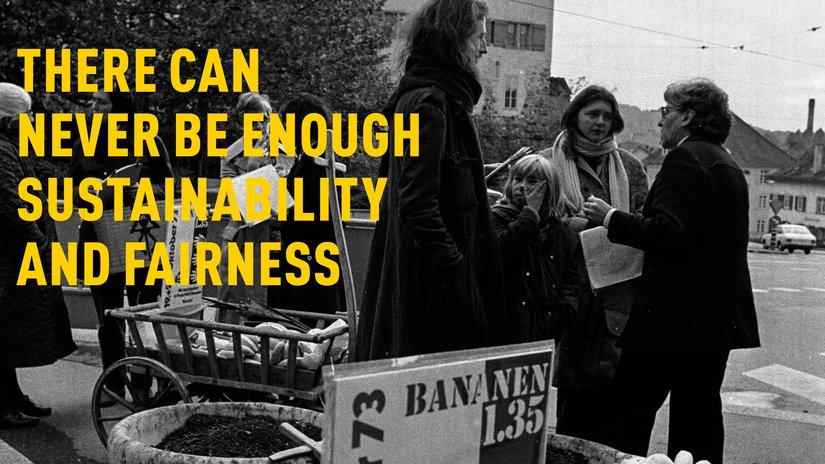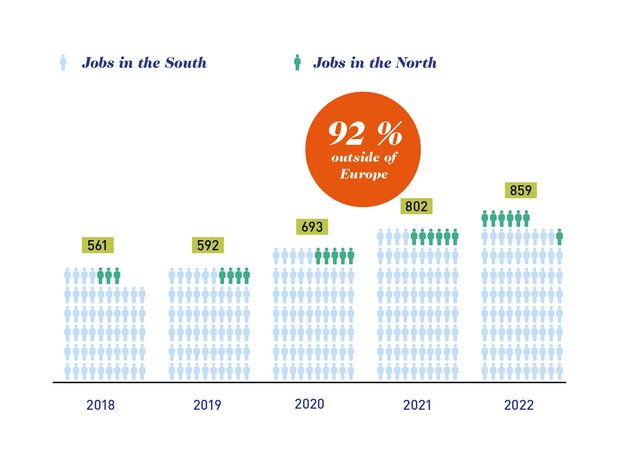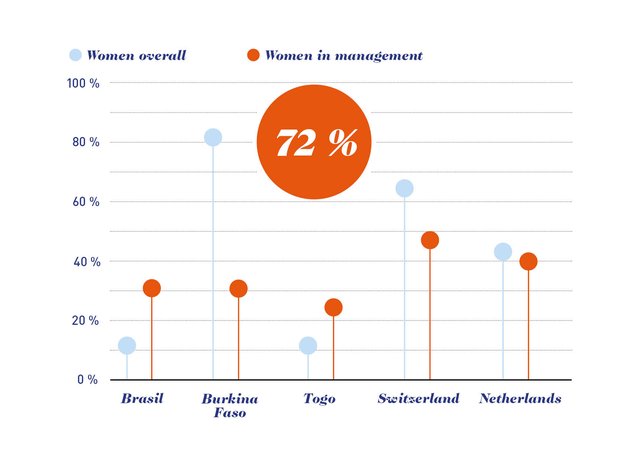Sustainability Figures 2022

2022 was a tough year for gebana. Despite growing by 17 % year-on-year compared to 2021, we made a loss of €1.5 million. But we still worked towards more sustainability, more biodiversity and more fairness.
The pandemic years provided gebana with a tremendous boost in development and two record results. And so, we took the bold decision to make major investments in 2022, spend more money on advertising and reduce prices in our online shop at the same time.
Then came Russia's attack on Ukraine. Fear was quickly followed by inflation, both of which left the organic and fair trade market in a state of shock. Direct shipping was affected, but our wholesale business was hit particularly hard. Read our annual report to learn more about how all of this impacted our business performance and how gebana's employees and supporters once again proved their commitment.
In addition to our business figures, we measure around 50 different indicators each year to assess the sustainability and fairness of our operations and identify areas that require further improvement.
The following sections and graphs are taken from this sustainability report. The figures are also included in our annual report.
Revenue sharing and premiums paid
In 2022, we expanded the gebana model – the most important tool in our sharing approach – to other countries. As a result, the total amount of premiums paid out increased by 22 % to 1.62 million euros.
The total share of sales that remained in the South rose to 84 % in 2022. A new record!

The share of sales in the South is the percentage of gebana's total sales that gets paid to the producing countries. The fair trade premiums include the Fairtrade and gebana model premiums as well as the solidarity contributions, for example for the olive oil from Palestine.
Family farmers and farm size
In West Africa, we work directly with a growing number of family farmers.. In 2022, an additional 1'802 families in Brazil, Burkina Faso and Togo came on board. The total number of family farmers is now 11'851.

Expenditure on research and consulting
In 2022, we once again invested in the cooperation with family farmers and development of more efficient farming methods. 21 % more funding went into research and consulting than in the previous year. Dynamic agroforestry remained one of our top priorities.
We distributed 18'000 plants to 327 family farmers in Togo to help them diversify their cocoa plantations. In addition, 924 family farmers received around 38'000 cocoa seedlings to rejuvenate their plots.
In Togo and Burkina Faso, around 10'800 farmers took part in more than 400 training courses on sustainable agricultural practices.

Investments and risks in the South
54 % of our assets work in the South. Even though this figure dropped slightly compared to the previous year, the total value of our investments was higher than in 2021, totalling 1.3 million euros. Most of the money went to land and machinery for our new factory in Burkina Faso. To read more about this, visit our project page.
The graph below shows investments in fixed assets in the South. They are calculated as a percentage of total assets. Absorbed losses are calculated as restructuring, write-offs and gifts to companies in the South.

Jobs
Even though 2022 was a challenging year for the economy, gebana has more employees than ever before - 57 new employees joined the company last year.
By the end of the year, gebana employed 859 people, 92 % of whom were located outside of Europe. During our busiest period – right after the mango and cashew harvest – 1'077 people worked for gebana throughout the world.
The graph below shows the number of jobs, calculated as a yearly average in order to factor in seasonal jobs added during and immediately after the harvest season.

Jobs by gender
A good deal more women than men work at gebana throughout the world. Women are still under-represented in management in the Global South.

Wages
Because we didn't make a profit in 2022, employees did not receive a share of the revenue. As a result, wages decreased compared to the previous year.
The graph shows the wages in the lowest wage category compared to the national minimum wage, including revenue sharing.

Sustainability of our product range
The share of certified organic products in our range increased to 91 % last year, nearing the record we set in 2018.
The share of products delivered to our customers' homes directly from family farmers was 55.8 %, around 4 % higher than in the previous year.
The share of non-repackaged products increased once again to reach a record level of 75 %.

Revenue sharing
Unfortunately, instead of making a profit in 2022, we made a loss of 1.5 million euros. As a result, employees, customers and investors did not receive a share of the revenue.
Read more about what we do in profitable years on our page about why we share.


 Login
Login

